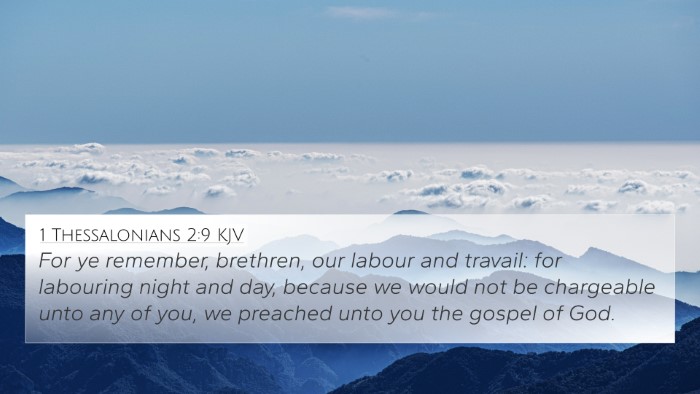Understanding Acts 18:3
Acts 18:3 states, "And because he was of the same trade, he stayed with them and worked; for by occupation they were tentmakers." This verse provides insight into the life of the Apostle Paul during his missionary journey. Below is a summarized meaning of this verse, integrated from various public domain commentaries including those by Matthew Henry, Albert Barnes, and Adam Clarke.
Contextual Background
This passage occurs in the narrative of Paul's second missionary journey. Paul meets Aquila and Priscilla in Corinth, who, like him, were tentmakers. Their common profession lays the groundwork for a profound partnership in ministry.
Commentary Insights
- Matthew Henry: Henry emphasizes the significance of Paul’s choice to work alongside Aquila and Priscilla. This not only illustrates Paul's humility but also his commitment to supporting himself while spreading the gospel. Henry notes how this relationship expands beyond mere trade into a partnership in faith.
- Albert Barnes: Barnes points out the importance of shared labor in the Christian community. He remarks on how their common profession facilitated spiritual fellowship and collaboration in missionary work. Paul’s tentmaking signifies the value of diligence and self-support in ministry.
- Adam Clarke: Clarke highlights the cultural context of tentmaking as a respected trade. He draws attention to the apostle's adaptability and connection to the people of Corinth, which enhanced his credibility as a preacher. Clarke also notes that this was part of Paul’s broader strategy to not be a financial burden on the new churches he founded.
Thematic Connections
Acts 18:3 serves as a valuable example of how practical vocations can play a role in spiritual endeavors. The merging of daily work with ministry reflects the broader theme of faith in action throughout the scriptures.
Bible Verse Cross-References
Here are some related scriptures that bring depth to the themes found in Acts 18:3:
- 1 Corinthians 9:14: Highlights the principle of ministers being supported by those they serve.
- 2 Thessalonians 3:8: Paul discusses his own practice of laboring to avoid being a burden.
- Philippians 4:15-16: Talking about the support received from the Philippians during his ministry.
- Acts 20:34-35: Paul reinforces his practice of self-support and helping the weak.
- Romans 12:11: Encouragement to maintain zeal while serving the Lord.
- Colossians 3:23-24: The call to work heartily as for the Lord, reinforcing the sacredness of work.
- 1 Thessalonians 4:11-12: Encourages believers to aspire to lead a quiet life and work with their hands.
Inter-Biblical Dialogue
This verse creates a dialogue between the idea of secular work and sacred calling, where Paul, a revered apostle, engages in manual labor while also proclaiming the gospel. The mutual dependencies between work and faith are echoed throughout both the Old and New Testaments, revealing a consistent theme of divine purpose in everyday activities.
Practical Applications
Understanding Acts 18:3 invites believers to appreciate the intersection of vocation and ministry. It challenges the notion of separating secular work from spiritual endeavors, encouraging practitioners to view all work as a form of worship and service.
Conclusion
Overall, Acts 18:3 illustrates the life of Paul not just as a spiritual leader but as a dedicated worker. By understanding this verse and its connections to other scriptures, we can gain a richer perspective on our own lives as we seek to integrate our faith into our work.
Additional Resources
For further studies, one could utilize Bible concordance or a cross-reference Bible study guide to explore the interconnected themes and narratives present in the Bible. These tools can help trace connections between Bible verses and facilitate a deeper understanding of Bible themes.










